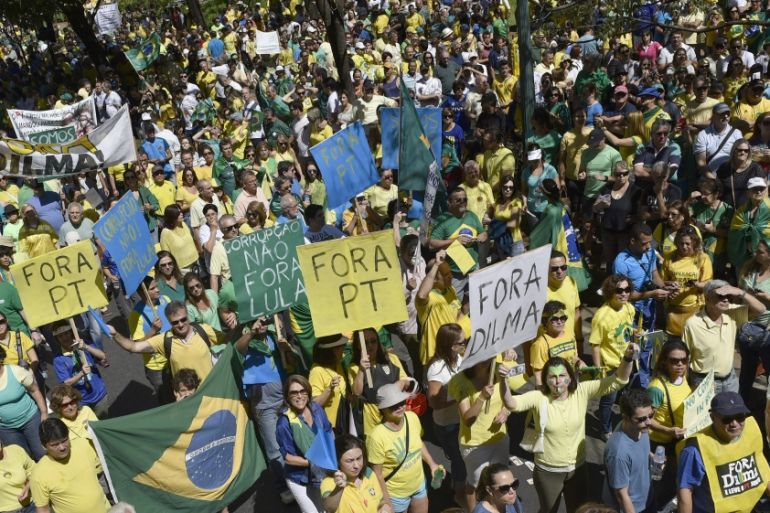Thousands join anti-government protests across Brazil
Demonstrators rally in cities across the country, protesting against corruption and calling for the president to resign.

Tens of thousands of demonstrators have held protests across Brazil calling for Dilma Rousseff to step down, blaming the president for the corruption and economic troubles besetting Latin America’s largest country.
The rolling demonstrations began on Sunday in the capital Brasilia, where organisers said 45,000 people attended, while police put the number at 25,000.
Next came the 2016 Olympic host city Rio de Janeiro, where an Olympic bicycling test event had to be rerouted as tens of thousands took over the seafront avenue along Copacabana Beach.
RELATED: Brazil president losing main bastion of support
Another protest was held in the country’s financial capital Sao Paulo, with more gatherings staged in about 200 towns and cities, organisers said.
“I’m coming out to show my indignation,” said Mosack, 65, wearing the canary yellow jersey of Brazil’s national soccer team as he joined a sea of green and yellow along Sao Paulo’s central thoroughfare Avenida Paulista.
It was the third nationwide day of protests against Rousseff’s government to be held this year, following large-scale demonstrations in March and April.
Rousseff is fighting for her political life amid a snowballing corruption scandal involving the oil company Petrobras that has embroiled politicians from her Workers’ Party, as well as a sputtering economy, spiraling currency and rising inflation.
Impeachment
|
|
Al Jazeera’s Hoda Abdel-Hamid, reporting from Copacabana beach, said the turnout for Sunday’s protests was extremely important as everyone had been closely watching how many people would show up.
“These protests are not only in Rio de Janeiro but currently in nine other states in Brazil,” she said.
“The protesters here behind me are calling for Rousseff to leave, there are some banners in English also calling on the international community not to recognise her as the president of Brazil.
“But according to the law in this country, you must have some kind of legal wrongdoing during your presidency to get impeached.”
Political analysts in Brazil have said that the final turnout at Sunday’s demonstrations could determine the protest movement’s future.
They argue that massive crowds could ratchet up the pressure on the government, while an anaemic turnout would give Rousseff some breathing room.
‘Government is a failure’
The demonstrations were called largely by web-based activist groups, with demands ranging from Rousseff’s impeachment to a return to military rule like the one that governed the country from 1964 to 1985.
Operation “Car Wash,” which began more than a year ago as an investigation into a bribes-for-contracts scheme at Petrobras, has exposed how widely corruption permeates Brazilian society, catching top members of the Workers’ and other political parties, as well as executives of powerful construction companies.
Amid the corruption probe and an economic crunch that has seen the once-booming economy teeter on the brink of recession, Rousseff’s popularity ratings have fallen to a level not seen since 1992, when President Fernando Collor de Mello was forced from office after being impeached for corruption.
RELATED: Is Brazil ready for the Olympics?
A poll earlier this month showed only eight percent of those surveyed considered Brazil’s government to be “great” or “good.”
By contrast, 71 percent said the government is a “failure.” The Datafolha poll was based on interviews with 3,358 people on August 4 and 5 and had an error margin of plus or minus 2 percentage points.
In 2013, a wave of nationwide protests took analysts by surprise, with the largest crowds in a generation taking to the streets ahead of the Confederations Cup soccer tournament, a World Cup dry run.
Protesters were angry over lavish spending on stadiums and other infrastructure for the 2014 World Cup, which contrasted with the woeful state of Brazil’s public schools and hospitals.
Dissatisfaction over poor public services and high taxes continues to bubble as the country gears up for the 2016 Olympics.